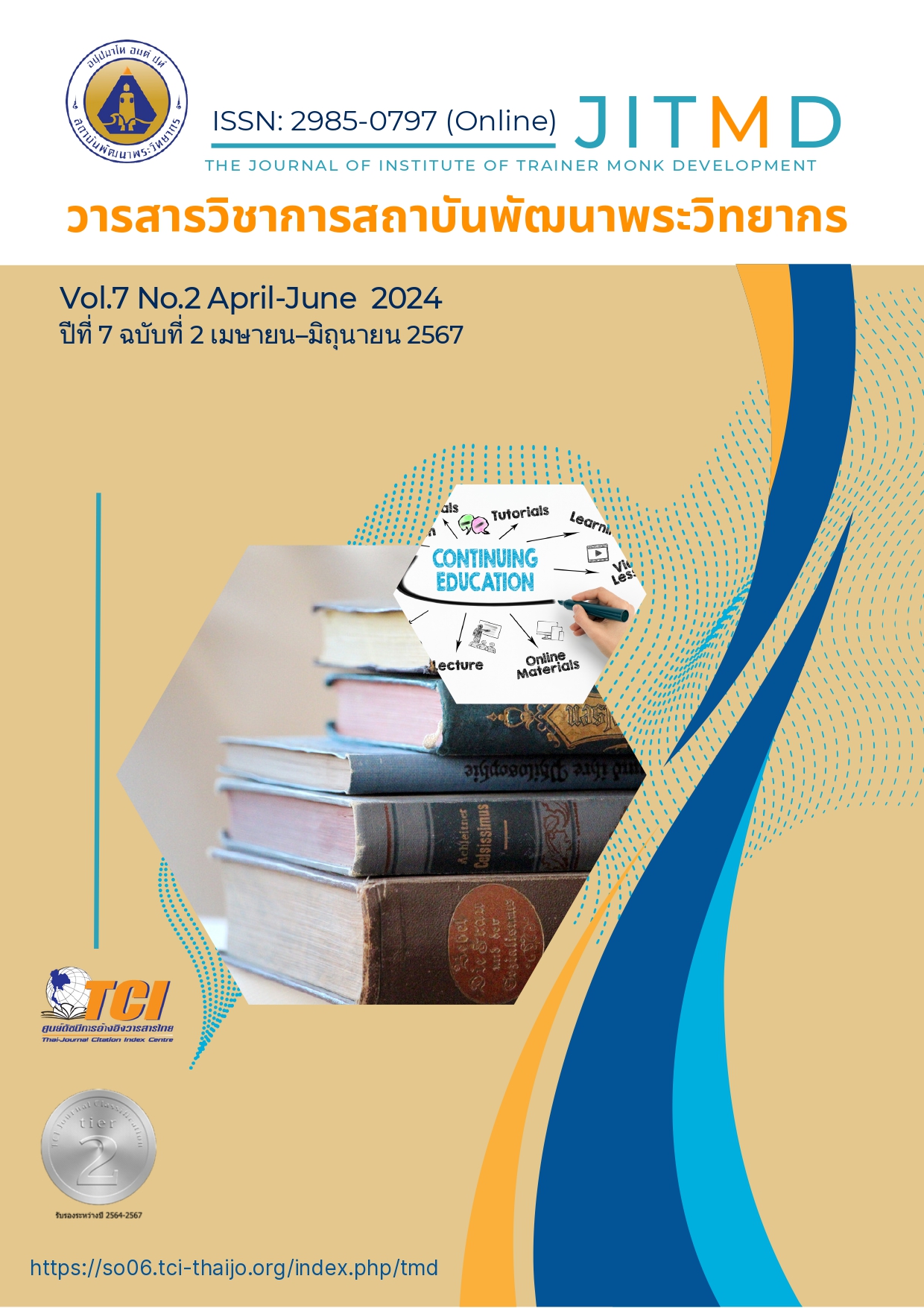The Administrators Leadership and Quality of Work Life of Teacher under Nonthaburi Primary Educational Service Area Office 1
Main Article Content
Abstract
The objectives of this research article are to study 1) the leadership of educational institution administrators. 2) Quality of working life of primary school teachers and 3) Leadership of educational institution administrators and the quality of work life of primary school teachers. Under the jurisdiction of the Nonthaburi Primary Educational Service Area Office, Area 1. It is descriptive research by using schools as the unit of analysis, the population includes 32 schools under the Nonthaburi Primary Educational Service Area Office, Area 1. There are 4 people providing information per school. The research instrument was a questionnaire regarding the leadership of educational institution administrators. According to the theory of Kush and Posner and principles, concepts, and theories regarding the quality of working life of teachers. According to the theoretical concept of Cummings and Worley Data analysis using ready-made programs Statistics used in data analysis include frequency, percentage, arithmetic mean. standard deviation and analysis of the Pearson correlation coefficient. The research results found that: 1. Leadership of educational institution administrators, the overall level is at a high level. and each aspect is at the highest level. Arranged from highest to lowest as follows: Process Challenges The show is an example of conduct. Inspiring a shared vision morale boosting and delegating authority to others to perform tasks in sequence. 2. Quality of working life of primary school teachers Under the jurisdiction of the Nonthaburi Primary Educational Service Area Office, Area 1, the overall level is at a high level. When considering each aspect, it is at the highest level. Arranged from highest to lowest as follows: Personnel potential development A safe and hygienic environment Regulatory aspect Pride in the organization Working together Fair and sufficient compensation Progress and stability in work and balance in personal life and work, respectively. 3. The leadership of school administrators is related to the quality of work life of primary school teachers. Under the jurisdiction of the Nonthaburi Primary Educational Service Area Office, overall, the relationship is at a moderate level. Statistically significant at the .01 level.
Keywords: Quality of Work;
Article Details

This work is licensed under a Creative Commons Attribution-NonCommercial-NoDerivatives 4.0 International License.
บทความที่ได้รับการตีพิมพ์เป็นลิขสิทธิ์ของวารสารวิชาการสถาบันพัฒนาพระวิทยากร
ข้อความที่ปรากฎอยู่ในบทความที่ได้รับการตีพิมพ์ในวารสาร ถือเป็นความรับผิดชอบของผู้เขียนบทความ และข้อคิดเห็นนั้นไม่ถือว่าเป็นทัศนะและความรับผิดชอบของกองบรรณาธิการวารสารวิชาการสถาบันพัฒนาพระวิทยากร
References
กนกอร สมปราชญ์. (2560). ภาวะผู้นำและภาวะผู้นำการเรียนรู้สำหรับผู้บริหารสถานศึกษา. (พิมพ์ครั้งที่ 2). ขอนแก่น: โรงพิมพ์คลังนานาวิทยา.
กานต์รวี ถาวรพันธุ์. (2556). ความสัมพันธ์ระหว่างภาวะผู้นำที่เป็นแบบอย่างของผู้บริหารกับการเป็นองค์กรแห่งการเรียนรู้ของจุฬาลงกรณ์มหาวิทยาลัย. วิทยานิพนธ์ศึกษาศาสตรมหาบัณฑิต คณะครุศาสตร์อุตสาหกรรม มหาวิทยาลัยเทคโนโลยีราชมงคลธัญบุรี.
ณัฏฐนฤเบศ วงศ์ภัทรโสภณ. (2566). คุณภาพชีวิตในการทำงานกับความม่งมั่นในการพัฒนาสายอาชีพของพนักงานราชการ ในจังหวัดพระนครศรีอยุธยา. สารนิพนธ์การจัดการมหาบัณฑิต. วิทยาลัยการจัดการ มหาวิทยาลัยมหิดล.
ถวิล อรัญเวศ. (2560). ผู้บริหารกับการครองตน ครองคน และครองงาน: สุดยอดนักบริหาร. นครราชสีมา: สำนักงานเขตพื้นที่การศึกษาประถมศึกษานครราชสีมาเขต 4.
ทิพสุคนธ์ บุญรอด. (2563). ภาวะผู้นำมุ่งบริการของผู้บริหารสถานศึกษากับคุณภาพชีวิตการทำงานของครู สังกัดสำนักงานเขตพื้นที่การศึกษามัธยมศึกษาเขต 9. วิทยานิพนธ์ศึกษาศาสตรมหาบัณฑิต. สาขาวิชาการบริหารการศึกษา แผน ก แบบ ก 2 ภาควิชาการบริหารการศึกษา บัณฑิตวิทยาลัย: มหาวิทยาลัยศิลปากร.
นิติพล ภูตะโชติ. (2559). พฤติกรรมองค์การ. กรุงเทพฯ: วีพริ้นท์.
ผ่องพรรณ พลราช. (2560). ภาวะผู้นำของผู้บริหารสถานศึกษาในศตวรรษที่ 21 สังกัดสำนักงานเขตพื้นที่การศึกษามัธยมศึกษา เขต 29. วิทยานิพนธ์ ค.ม. มหาวิทยาลัยราชภัฏอุบลราชธานี.
มนู สีนะวงค์. (2557). ภาวะผู้นำของผู้บริหารที่มีผลต่อความพึงพอใจในการปฏิบัติงานของพนักงานธนาคารพาณิชย์. วารสารวิชาการมนุษย์ศาสตร์และสังคมศาสตร์, 22(38): 273-289.
มัทนา วังถนอมศักดิ์. (2561). ภาวะผู้นำทางการศึกษา: ทฤษฎีและการปฏิบัติ. นครปฐม: มหาวิทยาลัยศิลปากร.
สำนักงานเลขาธิการสภาการศึกษา. (2560). แผนการศึกษาแห่งชาติ พ.ศ. 2560 -2579.กรุงเทพมหานคร: พริกหวาน กราฟฟิค.
สุธิกานต์ บริเอก. (2564). ภาวะผู้นำของผู้บริหารสถานศึกษาที่ส่งผลต่อการปฏิบัติงานของครูผู้สอนในโรงเรียนสังกัดสำนักงานเขตพื้นที่การศึกษามัธยมศึกษา เขต 22. วิทยานิพนธ์ปริญญาครุศาสตรมหาบัณฑิต. สาขาวิชาการบริหารการศึกษา มหาวิทยาลัยราชภัฏสกลนคร.
อมรา พิมพ์สวัสดิ์. (2562). ภาวะผู้นำของผู้บริหารสถานศึกษาที่ส่งผลต่อประสิทธิผลการปฏิบัติงานของครูสังกัดสำนักงานเขตพื้นที่การศึกษามัธยมศึกษา เขต 31. วิทยานิพนธ์ ค.ม. นครราชสีมา: มหาวิทยาลัยราชภัฏนครราชสีมา.
อรพรรณ เทียนคันฉัตร. (2560). ภาวะผู้นำเชิงพฤติกรรมของผู้บริหารสถานศึกษาที่ส่งผลต่อแรงจูงใจในการปฏิบัติงานของครู. วิทยานิพนธ์ ค.ม. มหาวิทยาลัยราชภัฏรำไพพรรณี.
Bass, Bernard M. and Avolio, Bruce J. (1994). Improving Organizational Effectiveness Through Transformational Leadership Thousand Oaks. Calif: Sage.
Best, John W. (2006). Research of Education. (10th ed.). New Jersy: Prenticc - Hall.
James M. Kouzes and Barry Z. Posner. (2012). The Leadership challenge: How to getextraordinary things done in organizations. (5thed.). CA: Jossey-Bass.
Kotter, John. P. & Cohen, Dan. S. (2002). The Heart of Change Boston. Massachusetts: Harvard Business School Press.
Kouzes, J. M. & Posner, B.Z. (2007). The Leadership Challenge. (4thed.). San Francisco, CA: Jossey-Bass.
Mahnaz Khorasani. (2012). "Assessing the quality of work life of primary school teacher in Isfahan city, Interdiscriplinary". Journal of Contemporary Research in Business, (3)(9): 20-32.
Thomas G. Cummings and Christopher G. Worley. (1997). Organization Development and Change. (6thed.). Ohio: South-Western College Publishing.
Ulrich, D. et al. (2001). The Leader of the Future: New Vision, Strategies and Practice for the Next Era. San Francisco: Jossey Bass.
WHOQOL Group. (1996). WHOQOL-BREF introduction administration scoring and generic version of assessment field trail version. Geneva: World Health Organization.


